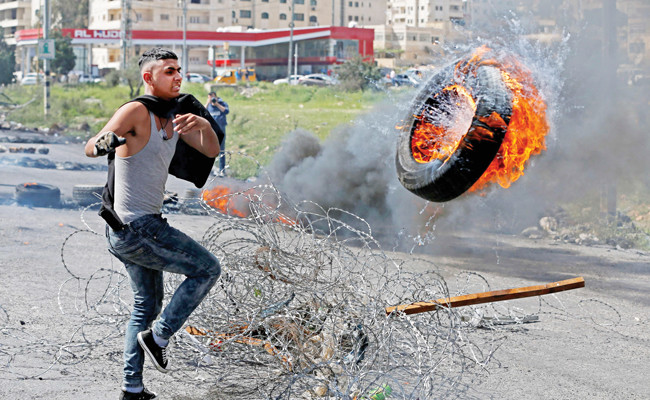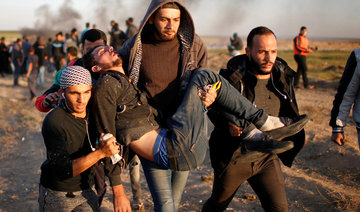Gaza Strip: At least nine Palestinians in Gaza were killed and over 1,000 others wounded on Friday after Israeli troops opened fire from across the border, officials said.
Thousands of Palestinians were protesting along Gaza’s sealed border with Israel, engulfing the volatile area in black smoke from burning tires to try to block the view of Israeli snipers and cheering a Hamas strongman who pledged that the border fence will eventually fall.
The Palestinian UN ambassador, Riyad Mansour, told reporters at UN headquarters in New York late Friday that one child is among the dead and a large number of children were injured, according to one report. He said his information comes from Health Ministry and Red Crescent officials in Gaza.
Among those killed or injured were hit by live fire and overcome by tear gas, the Gaza health ministry said. Twelve women and 48 minors were among those hurt, the officials said.
The deaths brought to 31 the number of Palestinians killed by Israeli fire since last week.
Mansour condemned “these massacres in the strongest possible terms” and demanded a halt and an independent investigation. The Arab League’s UN Ambassador Maged Abdelaziz echoed his condemnation and demands.
Kuwait’s UN Ambassador Mansour Al-Otaibi, the Arab representative on the Security Council, said a press statement has been circulated to members, almost identical to one blocked last week by the United States, that among other things calls for an independent and transparent investigation. The deadline for objections is 6 p.m. EDT.
In remarks clearly aimed at White House envoy Jason Greenblatt, Mansour denounced a statement that condemned Palestinians for calling for violence and sending protesters to the Gaza-Israeli border but never mentioned Israel’s “behavior” or urged restraint against firing on civilians.
“Shame on those who issue such statements, and they are totally on the side of the Israelis and condoning their behavior,” Mansour said.
Palestinians have vowed to continue their protests despite Israel’s tough response. “I’ve been coming every day, with my family, mother, sisters, brothers and children. I got close to the fence. I burnt tires. We want our land back,” Khaled Kafarna, who is 24, told Arab News.
“An hour ago near the border, I helped someone who got shot in the neck and killed. It’s dangerous here but we have to be here for our rights.”
Ali Bakroun, 19, told Arab News: “I came here with a group of my friends to fly a kite, which I made this week. I wrote our names on it. I’m not afraid to be shot or even killed. I don’t care. Our land deserves more of our lives.”
The day of violence, which saw bigger Palestinian crowds than in recent days but not as large as when the demonstration began last Friday, calmed down as night descended.
“Israel took everything from us, the homeland, freedom, our future,” said Samer, a 27-year-old protester who would not give his full name, fearing Israeli reprisals. “I have two kids, a boy and a girl, and if I die, God will take care of them.”
'Excessive force'
The latest casualties were bound to draw new criticism from rights groups that have branded Israel’s open-fire orders on the border as unlawful, after Israel’s defense minister warned that those approaching the fence were risking their lives.
The UN human rights office said Friday that it has indications that Israeli forces used “excessive force” against protesters last week, when 15 Palestinians were killed or later died of wounds sustained near the border.
An Israeli military spokesman defended the rules of engagement.
“If they are actively attacking the fence, if they are throwing a molotov cocktail that is within striking distance of Israeli troops or similar activities, then those persons, those rioters, become, may become, a target,” said Lt. Col. Jonathan Conricus.
Friday’s large crowds suggested that Hamas, the Islamic militant group that has ruled Gaza since a 2007 takeover, might be able to keep the momentum going in the next few weeks. Hamas has called for a series of protests until May 15, the anniversary of Israel’s founding when Palestinians commemorate their mass uprooting during the 1948 war over Israel’s creation.
Israel has alleged that Hamas is using the mass marches as a cover for attacking the border fence, and has vowed to prevent a breach at all costs.
The military said that on Friday, protesters hurled several explosive devices and firebombs, using the thick plumes of smoke from burning tires as a cover, and that several attempts to cross the fence were thwarted.
Gaza’s shadowy Hamas strongman, Yehiyeh Sinwar, told a cheering crowd in one of the protest camps Friday that a border breach is coming.
The world should “wait for our great move, when we penetrate the borders and pray at Al-Aqsa,” Sinwar said, referring to the major Muslim shrine in Jerusalem.
He was interrupted several times by the crowd, who chanted, “We are going to Jerusalem, millions of martyrs!” and “God bless you Sinwar!“
The mass protests are perhaps Hamas’ last chance to break a border blockade enforced by Israel and Egypt since 2007, without having to succumb to demands that it disarm. The blockade has made it increasingly difficult for Hamas to govern. It has also devastated Gaza’s economy, made it virtually impossible for people to enter and exit the territory, and left residents with just a few hours of electricity a day.
Israel argues that Hamas could have ended the suffering of Gaza’s 2 million people by disarming and renouncing violence.
Live fire
Friday’s marches began before Muslim noon prayers when thousands of Palestinians streamed to five tent encampments that organizers had set up several hundred meters (yards) from the border fence.
In one camp near the border community of Khuzaa, smaller groups of activists moved closer to the fence after the prayers. Demonstrators torched large piles of tires, engulfing the area in black smoke meant to shield them from Israeli snipers; the faces of some of the activists were covered in black soot.
Israeli troops on the other side of the fence responded with live fire, tear gas, rubber-coated steel pellets and water cannons.
After the first tires started burning, several young men with gunshot wounds began arriving at a field clinic at the camp.
Mohammed Ashour, 20, who had been among the first to set tires on fire, was shot in the right arm.
“We came here because we want dignity,” he said resting on a stretcher before paramedics transported him to the strip’s main hospital.
Yehia Abu Daqqa, a 20-year-old student, said he had come to honor those killed in previous protests.
“Yes, there is fear,” he said of the risks of advancing toward the fence. “We are here to tell the occupation that we are not weak.”
The death toll since last week includes the 22 protesters killed during the Friday protests at the border, as well as one killed during a protest on Tuesday.
The six other deaths include three Palestinian gunmen killed in what Israel said were attempts to attack the border fence and three men who were struck by Israeli tank fire.
At the United Nations, Secretary-General Antonio Guterres urged all parties to exercise maximum restraint, said UN spokesman Stephane Dujarric.
He said UN Mideast envoy Nickolay Mladenov had been in touch with Israeli and Palestinian officials to reinforce “the need to allow people to demonstrate peacefully.” Mladenov stressed the need to ensure that “excessive force is not used, and the need to ensure that children are not deliberately put in harm’s way,” Dujarric said.
A White House envoy urged Palestinians to stay away from the fence. Jason Greenblatt said the United States condemns “leaders and protesters who call for violence or who send protesters — including children — to the fence, knowing that they may be injured or killed.”
Hamas has billed the final protest, set for May 15, as the “Great March of Return” of Palestinian refugees and their descendants, implying they would try to enter Israel. Two-thirds of Gaza’s residents are descendants of refugees.
Palestinians commemorate May 15 as their “nakba,” or catastrophe, when hundreds of thousands were uprooted from homes in what is now Israel.



























